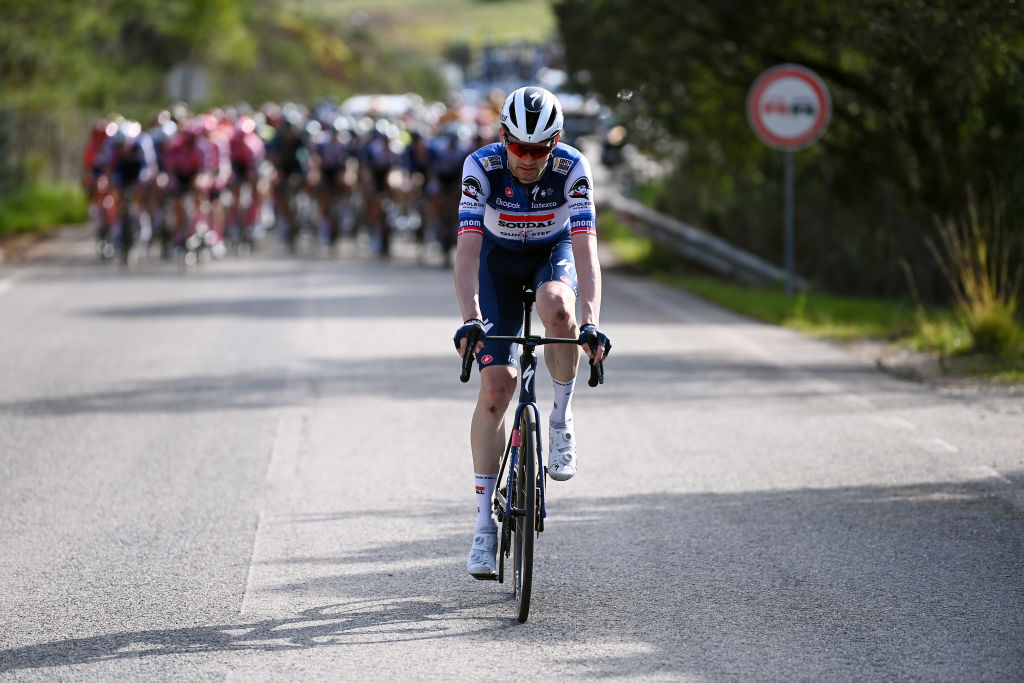Kasper Asgreen: By Flanders and Roubaix I will be in full flight
Dane making progress on his 'long way back' from knee injury and fatigue syndrome

Kasper Asgreen has been an active presence at the Volta ao Algarve, teeing up both the first bunch sprint and the stage 2 summit finish before leading a frantic breakaway pursuit on stage 3 and then breaking away himself on the second hilly stage, earning himself the blue mountains jersey for his efforts.
There is little sign of the fatigue syndrome that put an end to his 2022 season in the middle of July and the Dane is making the most of every opportunity in a race against time to hit top form for the Classics.
"It's been a bit of a long way back. I had four months without doing much last year, so I started further behind that normal," Soudal-QuickStep's Classics leader told Cyclingnews.
"But it seems to be going ok so far. It's definitely coming along, but still with some work to do."
The fatigue syndrome has its roots in the crash Asgreen suffered at the Tour de Suisse, where he was left with a 'deep wound' on his left knee. He scrambled to be fit enough to race the Tour de France, which started in his native Denmark, and struggled through the opening week, but it soon became clear the injury had not healed sufficiently.
A month later, it was announced that Asgreen's season was over, with the fatigue syndrome meaning he was not even recovering from low-intensity efforts as he attempted to resume training.
"The fatigue syndrome was secondary. The main problem was the knee. The fatigue syndrome came because of the body being just very tired with the hard block of training towards the Tour then crashing and trying to recover from it, trying to get ready for the Tour, then starting the Tour... the hole just got too big.
Get The Leadout Newsletter
The latest race content, interviews, features, reviews and expert buying guides, direct to your inbox!
"Once I took a good break, the fatigue syndrome went away. But the main concern was still the knee. I lost a lot of muscle mass on the quadricep. That was the main work I did, trying to get that back working and building that strength back. It was a lot of time in the gym.
"After that, I could start my training again in October, and I kind of transitioned from rehab to normal strength training and normal training on the bike.
When it comes to winter training, riders often refer to the season just gone as a sort of 'base' and so, although Asgreen has had plenty of time from October to now, he had much more ground to make up in terms of getting truly race-ready for 2023.
After a couple of appearances at the Challenge Mallorca series, where he was outside the time limit in the Trofeo Andratx and 127th at Trofeo Palma, his time in Portugal, where the Figueira Classic preceded the Volta, has been an important building block.
"I would obviously like to be a bit further ahead than I am right now, but I'm getting there," Asgreen said.
As such, there are limited expectations for the so-called Opening Weekend in Belgium next week, but hope still for the main Classics period – including the Monuments of the Tour of Flanders and Paris-Roubaix – in late March and early April.
"That's all it is: hard work. There are no shortcuts. I still have a lot of work to do but I think by Flanders and Roubaix I'll be in full flight."
Patrick is a freelance sports writer and editor. He’s an NCTJ-accredited journalist with a bachelor’s degree in modern languages (French and Spanish). Patrick worked full-time at Cyclingnews for eight years between 2015 and 2023, latterly as Deputy Editor.
